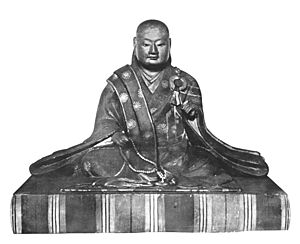Emperor Go-Nara facts for kids
Quick facts for kids Emperor Go-Nara後奈良天皇 |
|||||
|---|---|---|---|---|---|

Seated figure of Emperor Go-Nara
|
|||||
| Emperor of Japan | |||||
| Reign | June 9, 1526 – September 27, 1557 | ||||
| Coronation | March 29, 1535 | ||||
| Predecessor | Go-Kashiwabara | ||||
| Successor | Ōgimachi | ||||
| Shōguns |
See list
|
||||
| Born | Tomohito (知仁) January 26, 1495 |
||||
| Died | September 27, 1557 (aged 62) | ||||
| Burial | Fukakusa no kita no misasagi (深草北陵) Kyoto | ||||
| Issue among others... |
Emperor Ōgimachi | ||||
|
|||||
| House | Yamato | ||||
| Father | Emperor Go-Kashiwabara | ||||
| Mother | Fujiwara Fujiko | ||||
| Signature |  |
||||
Emperor Go-Nara (後奈良天皇, Go-Nara-tennō, January 26, 1495 – September 27, 1557) was the 105th Emperor of Japan. He followed the traditional order of emperors. He ruled from June 9, 1526, until his death in 1557. This time was known as the Sengoku period, a time of many wars in Japan. His personal name was Tomohito (知仁).
Contents
Family of Emperor Go-Nara
Emperor Go-Nara was the second son of Emperor Go-Kashiwabara. His mother was Fujiwara Fujiko.
He had several children:
- His first son was Imperial Prince Michihito. He later became Emperor Ōgimachi.
- He also had daughters, including Princess Eiju and Princess Seishū.
- One of his sons became a Buddhist priest named Kakujyo.
Key Events in Go-Nara's Reign
Emperor Go-Nara's time as ruler was during a difficult period in Japan.
Becoming Emperor
- Daiei 6, June 9, 1526: Go-Nara became emperor after his father, Emperor Go-Kashiwabara, passed away. He was 31 years old when he started his reign.
Challenges and Conflicts
- Daiei 6, 1526: An army from Awa Province marched towards Miyako. Hosokawa Takakuni fought them at the Katsura River. With help from Hosokawa Takakage, they managed to stop the invading army.
- Daiei 6, 1526: The Shōgun Ashikaga Yoshiharu held an archery contest. He invited archers from nearby areas to the capital city.
Coronation and Financial Struggles
- Tenbun 4, March 29, 1535: Emperor Go-Nara was officially crowned. This happened ten years after he became emperor.
- The Imperial Court was very poor at this time. They had to ask for money from powerful families called daimyō.
- Families like the Hōjō clan, the Ōuchi clan, and the Imagawa clan gave money. This allowed the emperor to have his coronation ceremony.
- The emperor was so poor that he even sold his beautiful calligraphy artwork to make money.
New Discoveries and Troubles
- Tenbun 11, 1543: A Portuguese ship arrived in Japan at Tanegashima. This was important because European guns were brought to Japan for the first time.
- Tenbun 20, 1551: There was a big problem in the Ōuchi clan called the Tainei-ji incident. Courtiers were planning to move the emperor from Kyoto, which was full of war, to Yamaguchi. However, many courtiers were killed in this incident.
- This event caused many court records to be lost. Knowledge about court traditions and how to make the imperial calendar was also lost. The emperor stayed in Kyoto.
Death of the Emperor
- Kōji 3, September 5, 1557: Emperor Go-Nara passed away at the age of 62. It took 70 days for him to be buried.
Emperor Go-Nara is buried with other emperors at an imperial tomb. It is called Fukakusa no kita no misasagi (深草北陵) in Fushimi-ku, Kyoto.
Important Court Officials
Kugyō (公卿) was a special name for a few very powerful men. They worked closely with the Emperor of Japan before the Meiji period. Even when the emperor's power was not strong outside the palace, these officials were still important.
This group usually had only three or four men at a time. They were from noble families and had a lot of experience. During Go-Nara's reign, some of these top officials included:
Eras During Go-Nara's Rule
The years of Emperor Go-Nara's reign are known by different era names or nengō. These eras help historians keep track of time.
See also
 In Spanish: Go-Nara Tennō para niños
In Spanish: Go-Nara Tennō para niños
- Imperial cult
| Regnal titles | ||
|---|---|---|
| Preceded by Emperor Go-Kashiwabara |
Emperor of Japan: Go-Nara 1526–1557 |
Succeeded by Emperor Ōgimachi |
 | Frances Mary Albrier |
 | Whitney Young |
 | Muhammad Ali |

